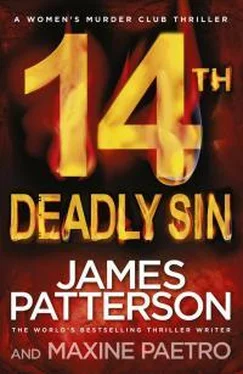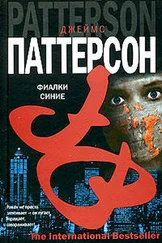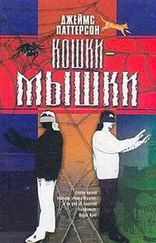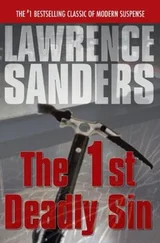And she wasn’t laughing now when she told me she had taken a major fork in the road.
I pounded the ketchup bottle in the direction of my fries and said, “What fork?”
“I took the job,” Yuki said.
She put down her utensils, abandoned her salad, and told me about a not-for-profit called the Defense League and that her client was dead.
“Who is this dead client and what are you supposed to do for him?” I asked.
“His name was Aaron-Rey Kordell, and he may have been coerced by the police into confessing to a triple homicide he didn’t commit. Then, while awaiting trial in the men’s jail, he was murdered in the showers by person or persons unknown.”
I grunted. A big part of the job was to get confessions. Cops were allowed to lie, and it was conceivable that people got worked over or tricked and confessed to things they didn’t do—but not often. Not that I knew about.
Yuki was saying, “Lindsay, if this story is in fact true, if Kordell was coerced into a confession and was then killed while awaiting trial, this is going to be a case against the city, the SFPD, and probably the cops who interrogated him, for I don’t know how many millions.”
I stopped eating.
A lawsuit against the police department would be a disaster for everyone in it, no doubt about it. A disaster. As Yuki’s friend, I had to be a fair sounding board. But never mind me.
“Your husband is a lieutenant in the SFPD,” I said.
“I know that, Linds.”
“What does he say?”
“He’s pissed off. We’re barely speaking.”
“Oh, man. You’re pretty sure Kordell was innocent?”
“He was caught with the gun on him. He was fifteen. Low IQ. It would have been fairly easy to get him to confess. I’ve seen the video of the interrogation. The narcs lied their faces off, Linds. Like ‘Tell us what you did and then you can go home.’ Then they told him what he did—their version.”
Yuki went on. “It might help me if I knew why Aaron-Rey was killed. Did he just piss someone off in jail? Or was he killed to avenge the deaths of those drug dealers? Because that would go to him being guilty.”
“I hope I don’t live to regret this, Yuki,” I said, “but I’ll see who was in lockup at the same time as Kordell. See what I can see. I don’t promise anything.”
“Just promise that whatever happens, we’re still buds.”
“ That I can promise,” I said.
CHAPTER 38
AT JUST BEFORE 5 p.m. that day, Yuki followed Officer Creed Mahoney through several steel doors and gates to the jail on the sixth floor of the Hall of Justice. From there she was escorted to one of the claustrophobic counsel rooms with high barred windows, reserved for meetings between prisoners and lawyers.
She’d been waiting for about ten minutes when the door opened and Li’l Tony Willis clumped into the room in chains from wrists to ankles, all five foot nothing of him, wearing an orange jumpsuit and two full sleeves of tattoos, twists in his hair and ’tude on his face.
“Who are you again?” Li’l Tony asked as Mahoney threaded his chains through the hook in the table.
“Fifteen minutes, OK, Ms. Castellano?” said Mahoney. “I’ll be back.”
The door closed and locked.
Yuki said to the man-boy wife beater, drug dealer, and possible killer sitting across from her, “I’m an attorney. Yuki Castellano. I want to hear about Aaron-Rey Kordell getting killed. What happened?”
“Are you kidding me? You want to ask me did I kill him? Because no, I didn’t. Got any cigarettes?”
“I hoped you might be able to tell me who might have killed Kordell, because that could be helpful.”
“To who? I got nothing to tell you because I didn’t do nothing to that retard. So if that’s all, this is good-bye, Ms. Cassielandro.”
“Here’s what I know. You’ve given evidence against Jorge Sierra,” she said, referring to a savage Southern California drug lord who was known as Kingfisher, a man whose whereabouts were unknown. Even his true identity was a mystery.
“You were one of his inner circle, weren’t you, Tony? Don’t bother to lie. I know a lot of cops and I know you cooperated. If Sierra finds out, you’re going to have a very short li’l life.”
The kid looked scared for the first time. He shot his eyes around the small room, searching for a camera.
“Who said that?” he said. “Whoever said I ratted on the King is lying, lady. I’m no snitch.”
Yuki said, pressing on, “Let me be very clear. I’m not looking to pin Kordell on you. I’m looking to find out why that kid was killed.”
“Same thing,” said Tony Willis. “OK, listen, it wasn’t me. It mighta been a couple of guys in here working for the King that took him out. But tell you the truth, Kingfisher’s name was in the air, but I don’t think he had nothing to do with it.
“I’m spekalating, Ms. Cassielandro. I don’t know shit about who killed A-Rey. That’s all. And it’s for free.”
“I’ll have cigarettes for you in the canteen.”
“That’s it?”
“Here’s my card. You have any new thoughts about who killed A-Rey, get in touch. I’d consider that a big favor.”
After Tony Willis was taken away, Yuki rode the elevator down to the street, went to the underground garage, and found her car. She drove to her office, her mind on what Li’l Tony had told her, which was nothing.
Shit. She thought of Aaron-Rey, that sweet look on his face in the picture in his mother’s hands. She couldn’t imagine that boy killing three drug dealers who’d befriended him.
No matter how many ways she looked at it, Aaron-Rey killing three drug dealers made no sense at all.
CHAPTER 39
WICKER HOUSE PURPORTED to be a wholesale showroom for imported wicker and rattan furniture. It was on the edge of Bernal Heights, on Cortland Avenue, a medium-rent light-industrial area that became more residential as the two-lane road ran uphill.
This particular building was in the middle of the block, blending in with the row of chunky, putty-colored or gray cinder-block two- and three-story buildings, some with wood siding under the eaves, several with fire escapes, none of them giving off a feeling of welcome.
The back of the shop opened onto a parking lot, which was accessed by a service road. The back door was made of reinforced steel and posted with signs reading TO THE TRADE ONLY and APPOINTMENT REQUIRED. The name of the shop wasn’t posted, and neither was a phone number.
At just before three in the morning, there were seven cars in the parking area at Wicker House’s back door. One was a Mercedes SL belonging to the proprietor of Wicker House, Nathan Royce. The other vehicles belonged to the staff.
Also parked in the lot, not far from Wicker House’s back door but out of range of the surveillance camera, was an unmarked white Ford panel van. The man who went by the name of One was behind the wheel.
One had learned the Wicker House layout from an informant. The front part of the building’s ground floor was a half-assed showroom. The back of the ground floor was a lab with rear-door access, convenient for moving chemicals and product quickly.
The lab techs made synthetic drugs: cathinones, known on the street as bath salts, and cannabinoids, synthetic marijuana. The second floor of Wicker House was a short-term warehouse for the product waiting to be shipped out. There was also quite a lot of heroin on that floor, and at certain times, a lot of cash was in transit through the premises.
One’s informant had told him when shipments would move out of Wicker House to the hub of the larger enterprise, final destination unknown. Altogether, the payload was worth upward of five and a half million.
Читать дальше












